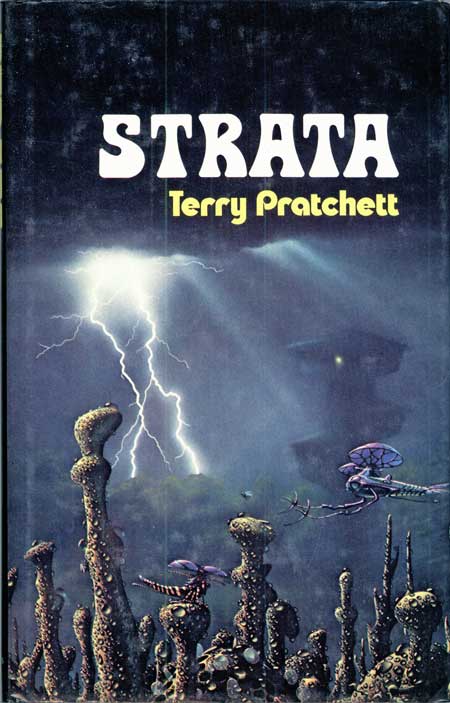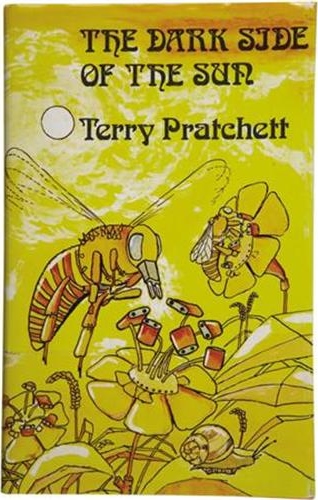#Pratchat18 Notes and Errata
These are the show notes and errata for episode 18, “Sundog Gazillionaire” featuring guest Will Kostakis, discussing the 1976 novel The Dark Side of the Sun.
- Since the 1990s many have claimed that if you play Pink Floyd’s hit 1973 album The Dark Side of the Moon while watching MGM’s The Wizard of Oz (1939), the songs supposedly sync up with the vision. Fans of “Dark Side of the Rainbow” (as it’s known) suggest hitting play when the lion roars for the second or third time, and claim the experience is profound, but the band and producers say any synchronicity between them is just a coincidence.
- Terry Pratchett’s first published novel was The Carpet People in 1971, five years before The Dark Side of the Sun. He was 23 at the time, but had started work on the book considerably earlier; the revised 1992 edition is described as being “co-written by Terry Pratchett, aged seventeen, and master storyteller, Terry Pratchett, aged forty-three”.
- “Galaxy Song” was written and performed by Eric Idle for the 1983 film Monty Python’s Meaning of Life. In a Python reunion live show which toured in 2015, Brian Cox appeared in a filmed insert nitpicking the song’s accuracy. It’s mostly close enough for rock and roll; in one of it’s most accurate lines, it actually says the galaxy is “100,000 light years side-to-side”, not 30,000. (Ben also made this mistake in an episode of re:Discovery.)
- Gilpin’s Space is a 1986 novel by Russian-born American sci-fi author Reginald Bretnor. It paints a dystopian authoritarian future in which “eccentric genius” Saul Gilpin steals a submarine and uses it to successfully test his new hyperdrive engine. The novel follows a group of his friends who follow his instructions to steal another submarine and escape the oppressive regime at home for other worlds. It’s…probably not going to stand up to a second read.
- The Dark Side of the Sun was first published (with a cover drawn by Terry!) in 1976 by Colin Smythe Ltd, who also published the original editions of The Carpet People and Strata. It was republished with cover art by prolific sci-fi artist Tim White, and then again by Pratchett’s later publisher Corgi in 1988, after the Discworld series had proven a hit. They used a new cover by Josh Kirby; Kirby also painted a second cover when another edition was printed by Doubleday in around 1993, which was also used for later Corgi editions.
- The trope of the ancient, all-powerful “Precursors” crops up in just about everything, as Ben mentions, but he forgot that Star Wars does have them – just not in the films. The Knights of the Old Republic videogame introduced the Rakata, an ancient culture whose advanced technology is important to the game’s plot.
- We previously covered the “E.T. is in Star Wars and Yoda is in E.T.” thing in our Guards! Guards! episode.
- Emperor Ptarmigan is definitely not Emperor Parmigiana, but for the uninitiated: “parmigiana” is an Italian dish made with crumbed fried eggplant, tomato sauce and cheese. In Australia the original only became popular fairly recently, but for many years a “chicken parmigiana” – which replaces the eggplant with a chicken schnitzel – has been a pub food staple for decades. It’s known variously as a “parma”, “parmo” or “parmi”, depending on where you’re from.
- The “Dom/Sub” joke that threatens to derail the podcast refers to dominance and submission – sexual play in which one or more parties are explicitly submissive to others. This can take many forms; we recommend you don’t learn about it through Fifty Shades of Grey, which many professionals say models an abusive relationship.
- In the original Star Wars films it’s established that a mystical “Force” permeates the Universe, and that some people – Jedi and Sith, mostly – are able to use it to perform various physical and mental feats. In the 1999 prequel The Phantom Menance, George Lucas introduced the idea that a person’s ability to use the Force relies on the concentration of microscopic lifeforms called “Midi-chlorians” in their blood. Fans did not like it. In his defence, Lucas originally had the idea back when he made the first film, but it’s still made the magic feel more mundane and opened up a lot of stupid questions about how it works.
- The “Bacta tank” is the big round jar Luke is in at the end of The Empire Strikes Back as he recovers from his injuries. “Bacta” is the name of the synthetic restorative liquid inside. Old Republic era stories establish that such tanks previously used Kolto, a naturally occurring liquid from the planet Manaan, but it was replaced by bacta a long time before the rise of the Galactic Empire.
- Robert Lawrence Stine, aka R. L. Stine, is a prolific American children’s horror author, best known for the hugely popular Goosebumps series of more than sixty books. The series has been adapted for both television and film, the latter with Stine appearing as a character, played by Jack Black.
- Plasmo is a shape-shifting alien “polybop” created by Australian animator Andrew Lawrence. Plasmo originally came to fame in the half-hour stop-motion animated film Happy Hatchday to Plasmo (1989), in which he is hunted by incompetent intergalactic mercenaries Coredor and Brucho. The film was screened repeatedly on the ABC for around five years in the early 1990s, and was eventually followed by Plasmo, a series of 13 5-minute episodes with higher production values. In the series, Coredor and Brucho have team up with Plasmo and his friends, and go on adventures together.
- In case the jargon left you confused, “MVP” is short for “Most Valuable Player”, and to “stan” someone is to be an obsessive fan of them. The former is originally a sports term, but has been extended to many other areas. The latter is both a portmanteau of “stalker” and “fan”, and a reference to the single “Stan”, about a murderously obsessive fan, from Eminem’s 2000 album The Marshall Mathers EP.
- In the 1997 Luc Besson sci-fi film The Fifth Element, an ancient “divine being” named Leeloo (played by Mila Jovovich) is blown up, and future Earth scientists use a sophisticated device to reconstruct her from her severed arm.
- The Foundation series of novels by Isaac Asimov, originally published in short story form in the 1940s, introduce the idea of “psychohistory”: a mathematical science that can predict the future. Unlike p-math, it only works at the level of human society as a whole, and over very long periods of time. The fictional inventor of psychohistory, Harry Seldon, records messages for future generations of humans many centuries after his own death to help guide the titular Foundation.
- It’s true: in the videogame Middle-Earth: Shadow of War, Shelob the giant spider can turn into an attractive human woman. This supposedly explains how she was able to talk to Gollum.
- In the Harry Potter spin-off Fantastic Beasts films, Ezra Miller plays Credence Barebone, a young man with a dark secret. It’s…pretty grim.
- The Ringworld books by Larry Niven, starting with 1970’s Ringworld, explore a vast, ring-shaped artefact created by – you guessed it – a mysterious and supposedly vanished unknown alien species.
- 2008’s Quantum of Solace was the twenty-second James Bond film, and the second to star Daniel Craig. It’s a direct sequel to Casino Royale, with Bond seeking revenge for the death of a friend and thereby uncovering the Quantum Group, who plan to stage a coup for commercial gain. They communicate in secret by means of earpieces during an opera performance.
- Monkey is a 1978 Japanese television series, adapting the Chinese folk novel Journey to the West. In the story, the priest Tripitaka is sent on a pilgrimage to India to fetch new Buddhist scriptures. As penance for past misdeeds, the immortal stone Monkey – along with the demons Pigsy and Sandy – is sent to be Tripitaka’s guardian. Monkey is forced to wear a golden headband, and Tripitaka is taught a special sutra which makes it constrict, causing Monkey considerable pain; this helps prevent him from fighting and killing everyone they meet. It’s a unique series in that it was dubbed by English actors who often did not have a complete script and improvised wildly based on synopses of each episode. It was fairly popular in Japan, but reached cult status in Australia and Canada. Some of the choices of accent and phrasing made by the (primarily white) voice cast we’d now consider problematic, at best.
- I Have No Mouth, and I Must Scream is a 1967 post-apocalyptic sci-fi/horror story written by Harlan Ellison. Considering its super dark and fatalistic tone, it was rather surprising when Ellison adapted into an adventure videogame in 1995.
- A Knight’s Tale was written, produced, and directed by Brian Helgeland in 2001. It stars Heath Ledger as a peasant who pretends to be a knight, and has basically nothing to do with the Chaucer tale from which it takes its name. (Paul Bettany does play Chaucer in the film, though.)
- 2001: A Space Odyssey is a 1968 film written by Arthur C Clarke (who also wrote a novelisation) and directed by Stanley Kubrick. The plot involves human astronauts travelling to Jupiter to investigate a monolith left behind by – you guessed it – a race of mysterious all-powerful aliens, though the star of the show is really the sinister intelligent computer, HAL.
- This note is for Sven: we’re sorry we forgot the second part of your question about which authors we think are most consistent in tone and quality of writing. We were really tired.
- Go Set A Watchman is a novel written by Harper Lee, published in 2015, fifty-five years after her classic To Kill a Mockingbird. She died the following year. While it was promoted as a sequel to Mockingbird, it was actually written first, and is considered by many to actually be an inferior first draft of her beloved first novel.


